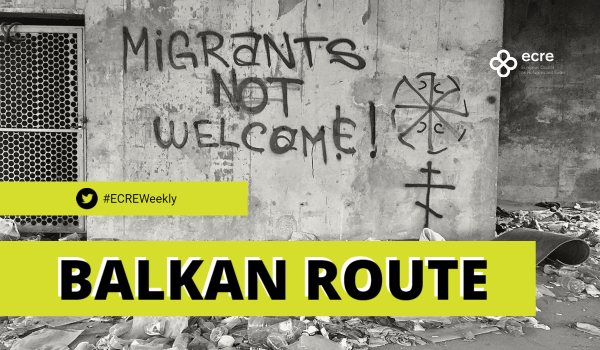The EU signed an “upgraded” agreement with Montenegro to organise joint operations along the border. Over 100 from a minority faith group were denied access to seek asylum at the Bulgarian border despite NGO appeals. Border Violence Monitoring Network (BVMN) calls for acknowledgement that the fundamental rights situation in North Macedonia is not in line with international and European Union human rights law after the killing of an asylum seeker on Greek-North Macedonian border.
Latest data published by Frontex reported that the Western Balkan route was the second most active in the first four months of 2023, with over 22,500 detections, marking a 21% decline in crossings through the route. On 16 May, the EU and Montenegro signed an “upgraded agreement” on operational cooperation in border management with Frontex to enter into force on July 1. The signature of this agreement is seen as a “tangible deliverable” on the EU Action Plan on the Western Balkans by the EU. “Frontex officers will be on all Montenegrin borders with neighbouring countries, not only Croatia. It will contribute to addressing irregular migration and further enhance security at the EU’s external borders,” said Montenegrin Interior Minister, Filip Adzic whose country saw 8,500 crossings in 2022. Commissioner for Home Affairs, Ylva Johanneson considered the agreement as “a strong testament to the ever-closer alignment” between Montenegro with the Union, adding that it will expand “support to Montenegro’s authorities in their fight against cross-border crime, in particular smuggling and trafficking of human beings, and ensuring respect and support for the rights of migrants traversing the region”. Margaritis Schinas, Vice-President of the Commission, said that the agreement is a proof of strong partnership between the EU and its Western Balkan partners in migration and border management, with Frontex already deploying over 300 personnel to the region at the Union’s external borders
More than 100 people from a minority faith group, the Ahmadi Religion of Peace and Light, presented themselves at the Turkish-Bulgarian borders and requested to apply for asylum on the Bulgarian side after reportedly being met with gun shooting and physical violence on the Turkish side. A number of NGOs in a joint statement, addressed to Frontex and the Bulgarian border guard, “call for their applications for international protection to be registered/lodged and treated with full, individualised assessments in Bulgaria in line with national law, European Union law and international human rights law”. Border Violence Monitoring Network (BVMN) communicated: “States and institutional bodies often complain that asylum seekers do not present themselves at formal border crossing points and seek to enter countries illegally. This indicates that there are legal pathways for presenting yourself at a border and asking for asylum”, adding “This group plan to do exactly that – and so we urge the response of the Bulgarian authorities and Frontex to align with national, EU, and international asylum and human rights law by granting them the opportunity to lodge their claim and have a full individualised assessment”. Meanwhile, Bulgaria’s Supreme Court has rejected a request for political asylum by 27-year-old Russian Aleksandr Stotsky, who fled Russia immediately after the start of Moscow’s invasion of Ukraine. Stotsky, a supporter of imprisoned Russian opposition leader Aleksei Navalny, is afraid of being forced to fight in Ukraine upon returning to his country.
In response to the killing of 23-year-old asylum seeker, Fatmata at the North Macedonian-Greek border on 19 April – a day after Frontex started its joint operations in the country – BVMN in a statement call on MEPs to “make a stand against these violations and on Frontex to answer questions with regards to its role in operations in a country that is routinely violating fundamental rights”. “We demand a full, prompt investigation and a fair trial, and acknowledgement that the fundamental rights situation in North Macedonia is not in line with international and Union human rights law”, stated the organisation.
Beneficiaries from Temporary Protection (TP) in Serbia have been faced with different hurdles exposed in a report from the Belgrade Centre for Human Rights. While the report highlights existing good practices, it also focuses on a number of challenges such as the difficulty for TP beneficiaries to access the labour market and healthcare. TP beneficiaries are also not entitled to financial aid for accommodation. The Belgrade Centre for Human Rights expresses several recommendations in the report, among which is the extension of the maximum duration of temporary protection to align with the EU.
For further information:
- ECRE, Balkan Route and Eastern Borders: Ongoing Violent Pushbacks from Croatia to Bosnia and Herzegovina, Pope Francis Urge Hungarians to Open Doors to Migrants, Latvia Criminalises Migrants Rights Defenders, 12 May
- ECRE, Croatia: Top Officials Share Sensitive Information on EU-Financed Border Operations, Ongoing Mass Deportations to Bosnia and Herzegovina, Italy to Hold Meeting with Croatia and Slovenia on “Balkan Route”, 14 April

